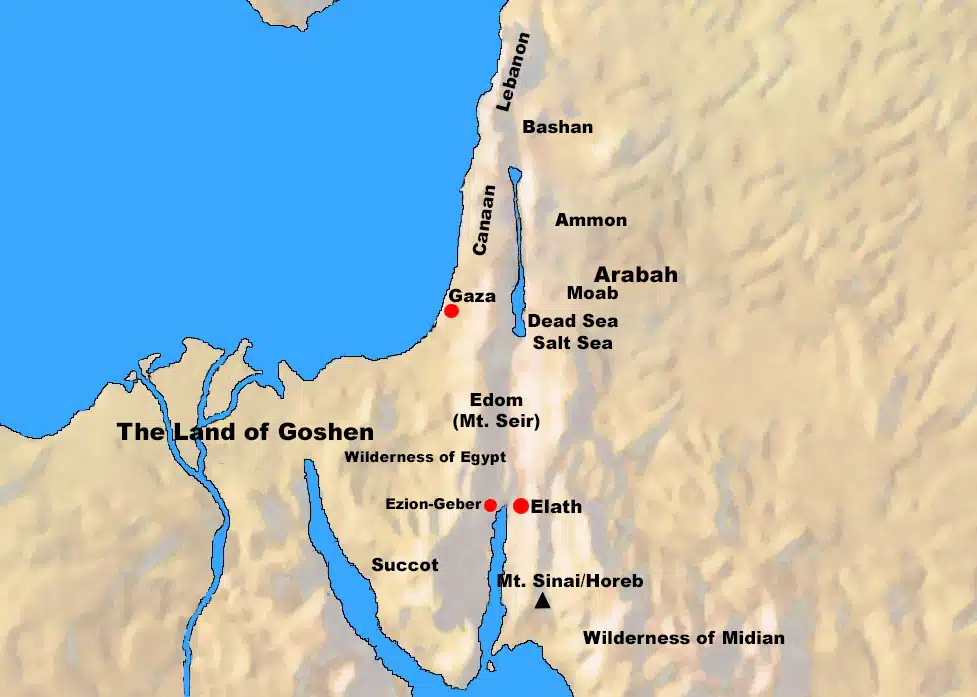Moses recalls the distribution of the territory of King Sihon to the tribes of Reuben and Gad, and the distribution of the territory of Og to the half-tribe of Manasseh.
After Israel’s victory over King Sihon of Heshbon and King Og of Bashan, Moses distributed ownership of their territories to tribes of Israel. Moses declared, “So we took possession of this land at that time.” The Reubenites and the Gadites received all the territory of King Sihon, as well as a portion of land extending from Aroer, which is by the valley of Arnon, and half the hill country of Gilead. The remainder of Gilead and the whole kingdom of Og were given to the half-tribe of Manasseh. Gilead is the northern part of the current country of Jordan.
According to the book of Genesis, the Reubenites were descendants of the first son of Jacob by his wife named “Leah” (Genesis 35:23). The Gadites were descendants of Jacob’s son named “Gad” by his maidservant, Zilpah (Genesis 35:26). The half-tribe of Manasseh, the first son of Joseph, consisted of two clans represented by Jair and Machir (Genesis 41:51). These tribes were to receive the portions of land located east of Jordan.
In verses 14-15, Moses proceeded to offer some details concerning the land he distributed to the half-tribe of Manasseh. Jair, who received all the region of Argob as far as the border of the Geshurites and the Maacathites, renamed his kingdom to Havvoth-jair. The border of the Geshurites was in the Golan heights, east of the Sea of Galilea. The Maacathites refer to the inhabitants of the small state called “Maaca” in the Golan heights located further north. Makir, the second clan of the half-tribe of Manasseh (in addition to Jair) received Gilead as his inheritance.
In verses 16-17, Moses summarized the occupation of this portion of land. He said, “To the Reubenites and to the Gadites I gave from Gilead even as far as the valley of Arnon, the middle of the valley as a border and as far as the river Jabbok, the border of the sons of Ammon; the Arabah also, with the Jordan as a border, from Chinnereth even as far as the sea of the Arabah, the Salt Sea, at the foot of the slopes of Pisgah on the east.”
The Reubenites and the Gadites settled from Gilead south to the valley of Arnon and east to the river Jabbok, the border of the Ammonites. Then, the Arabah, a term used as a synonym for “desert” is the continuation of the Jordan rift between the Dead Sea and the Gulf of Elath, approximately 110 miles long. The Arabah with the Jordan as its western boundary went from the sea of Chinnereth (that is, the Sea of Galilee), down to the sea of the Arabah, the Salt sea, at the foot of the slopes of Pisgah on the east. The mountain called “Pisgah” probably refers to Mount Nebo (Deuteronomy 34:1-4). It lies east of the Jordan River and northeast of the Dead Sea. It is identified with modern Ras es-Siyaghah, about ten miles of the Jordan River.
Biblical Text:
12 So we took possession of this land at that time. From Aroer, which is by the valley of Arnon, and half the hill country of Gilead and its cities I gave to the Reubenites and to the Gadites. 13 The rest of Gilead and all Bashan, the kingdom of Og, I gave to the half-tribe of Manasseh, all the region of Argob (concerning all Bashan, it is called the land of Rephaim.14 Jair the son of Manasseh took all the region of Argob as far as the border of the Geshurites and the Maacathites, and called it, that is, Bashan, after his own name, Havvoth-jair, as it is to this day.) 15 To Machir I gave Gilead. 16 To the Reubenites and to the Gadites I gave from Gilead even as far as the valley of Arnon, the middle of the valley as a border and as far as the river Jabbok, the border of the sons of Ammon; 17 the Arabah also, with the Jordan as a border, from Chinnereth even as far as the sea of the Arabah, the Salt Sea, at the foot of the slopes of Pisgah on the east.
Check out our other commentaries:
-
Psalm 121:1-2 meaning
The psalmist looks beyond the earth, up to God, and acknowledges that true help comes from Him....... -
Genesis 14:1-3 meaning
The Kings of the plains went to war with the kings from the east. It was four allied kings from the east against five allied...... -
Daniel 9:3-6 meaning
Daniel prays to God. He praises the Lord for His faithfulness, and confesses the sins of the Jews’ disobedience....... -
Exodus 32:21-24 meaning
After making the people drink the dust of their idol, Moses then confronted Aaron about his role in the fiasco. Aaron provided a weak explanation...... -
Deuteronomy 17:18-20 meaning
After listing the things that the Israelite king was to avoid, Moses then described what he was supposed to do—study the law of the LORD......




